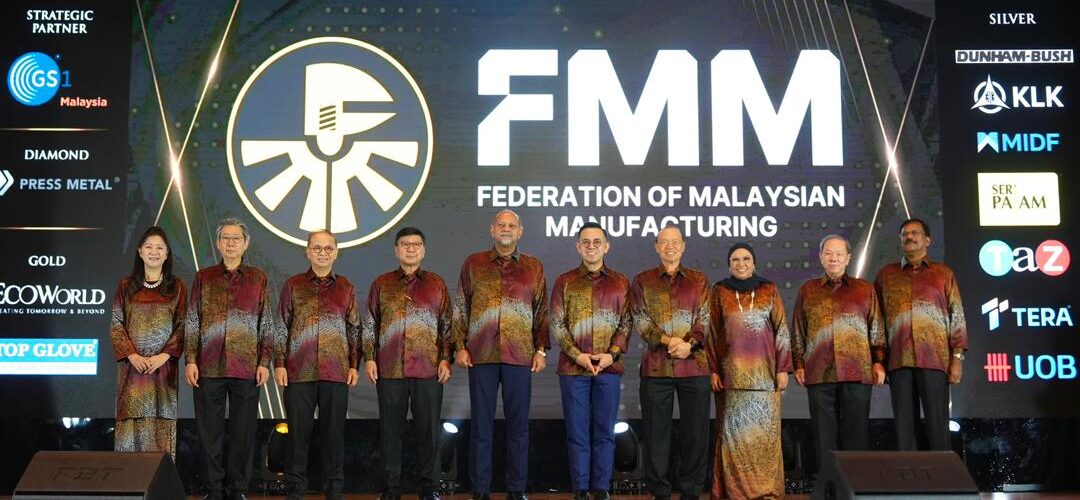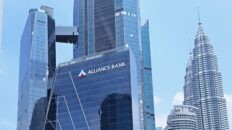By Aileen Anthony
18 August 2025 – The 57th FMM Annual Dinner was more than a celebratory gathering of Malaysia’s manufacturing stakeholders. The evening honoured enduring leadership, showcased Malaysia’s digital and economic ambitions and reminded all that at the heart of transformation is people.
Held at the Sunway Resort Hotel Ballroom, the event brought together policymakers, industry leaders and distinguished guests. With the presence of Prime Minister Dato’ Seri Anwar Ibrahim via a keynote video, Minister of Digital YB Gobind Singh Deo, and Minister of Human Resources YB Steven Sim Chee Keong, the night became a masterclass in shared vision, political will, and industrial courage.
But the heartbeat of the night was FMM President’s Tan Sri Dato’ Soh Thian Lai, whose farewell speech became a moving testimony to legacy, reform, and commitment.
A Farewell Graced with Humour, Heart and History
With characteristic charm and wit, Tan Sri Soh’s speech, peppered with humorous anecdotes and touching tributes, traced a transformative journey of service. But perhaps the most powerful moment was his simple admission, “This year marks 25 years with FMM but more meaningful is a chapter that began in 1975—the year I met my wife.”
What followed was not just a professional farewell, but a personal homage to sacrifice. “For 50 years, she’s been waiting and now it’s time for me to go home,” he said, drawing applause from the room.
Yet sentiment never outshone substance. Tan Sri Soh chronicled eight years of dynamic leadership that, among other achievements, saw FMM’s growth from 7,500 to over 13,000 members, the formation of its Youth Committee, CSR and Crisis Relief Fund, the signing of 61 MOUs with international peers and the submission of nearly 100 proposals to the government.
He also highlighted FMM’s advocacy on significant issues, including those on ESG reporting, AI integration, and being the first business federation in Malaysia to achieve the ISO 37001 compliance, an internationally recognised standard for anti-bribery management systems (ABMS).
To these he declared, “We led the mission, engaged with substance, and acted with purpose.”
Investing in Human Capital
In a candid and engaging speech, YB Tuan Steven Sim Chee Keong brought the house down with humour, factory tales, and a message of oh urgency, that human capital matters more than ever.
He illustrated his point with a story.
A factory security guard grew suspicious of a worker who kept wheeling out a wheelbarrow every day, seemingly carrying something hidden under a cloth. Day after day, the guard stopped him and searched the contents yet found nothing of value. Eventually, it dawned on him, the worker wasn’t smuggling anything inside the wheelbarrow. The wheelbarrow itself was what was being taken.
“The moral?” he said. “Focus on the wheelbarrow. In other words, focus on your people.”
The Minister grounded his speech in data and direction; RM77.2 billion was spent on digitalisation in 2024, over RM60 billion committed by tech giants like Google, Amazon, Microsoft, and ByteDance 46.5 billion ringgit in high-tech investments secured via the National Semiconductor Strategy.
Beneath the figures lay a concern, “AI cannot replace empathy, creativity, collaboration, and culture.” He stated that an overreliance on machines could risk a “value crisis”, where labour is seen as cost, not contribution.
The Minister announced that from September 1, RM2 billion from the HRD levy fund would be unlocked to subsidise the salaries of university and TVET graduates. “Tell your HR and your boards to focus on your people. Human capital is our wheelbarrow,” he said.
His closing sentiment landed with weight, “You succeed, we succeed. Malaysia succeeds.”
Designing the Future
YB Gobind Singh Deo set his sights firmly on the future. The Digital Minister delivered a high-level overview of Malaysia’s ascent as a digital powerhouse, reminding all that growth must be by design, not accident.
“In 2024 alone, we recorded RM163.6 billion in digital investment, a 250% increase from the previous year and generating more than 48,000 high-skiled employment opportunities,” he said. “This shows Malaysia is not just attracting attention. We’re earning trust.”
He emphasised that digital growth was not just a buzzword but an active strategy driven by world-class infrastructure and cutting-edge connectivity, trust, data security, and legal frameworks, AI-readiness and regional digital partnerships and SME digitalisation and innovation access.
He commended FMM for not just keeping up, but often leading from the front. “We must stop talking about change and start building it. FMM has shown what that can look like.”
The Backbone of Economic Resurgence
Prime Minister Dato’ Seri Anwar Ibrahim addressed the gathering via a video keynote that left a deep impression. His message, the manufacturing sector is the backbone of Malaysia’s economic resurgence.
“Our factories are not remnants of the past, they are the centre of the future,” he expressed. “This is where economic strength and innovation are born.”
He outlined a holistic vision aligned with Madani values which includes advancing integrated industrial ecosystems, aligning local supply chains with global expectations, encouraging green transition and AI integration and driving equitable trade through ASEAN-led cooperation.
He reaffirmed Malaysia’s role as a regional hub of trust, talent, and transformation, signalling the government’s intent to go beyond recovery and aim for reinvention.
A Night of Applause and a Call to Action
As the evening progressed, tributes flowed. Mr. Jacob Lee Chor Kok, FMM’s Deputy President, presented Tan Sri Soh with a symbolic sculpture of the Ox, emblematic of his strength, resilience, and dedication.
“He has shown us what it means to lead without fear or favour,” said Lee. “Now, we carry that baton forward.” The FMM also launched a rebrand commemorating the Federation’s official name change from the Federation of Malaysian Manufacturers to the Federation of Malaysian Manufacturing, to reflect its expansion to include related upstream and downstream manufacturing supply chain industries.
Key Highlights of the rebrand:
- New Logo & Wordmark: The refreshed FMM logo features bold uppercase letters symbolising strength, unity, and purpose. Each element reflects the Federation’s role in uniting industry (“F”), representing Malaysian manufacturing (“M”), and serving as a bridge across the ecosystem.
- Future-Driven Vision: FMM now positions itself as a platform for digital enablers, sustainability champions, and ecosystem builders. It is committed to regional engagement (ASEAN, RCEP), supply chain resilience, and inclusive green growth for SMEs.
- People-Centric Focus: Emphasising that the future of manufacturing lies in human capital, not just machines, FMM pledges to support workforce readiness through TVET and talent development.









